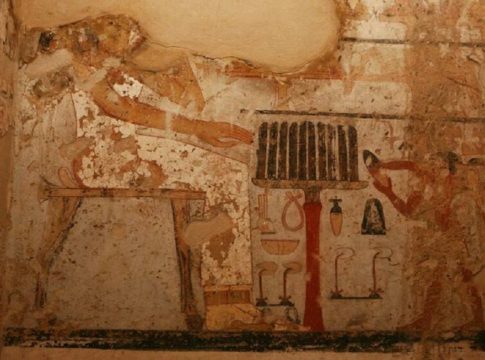As the Egyptian nation is rebuilding its economy and re-finding its identity after years of unrest that settled with the rejection of the Islamic Kalifate in mass protests in 2013, a recent discovery calls for the nation’s deliberation. Although the slogan of the Islamic Kalifate advocators called for Egyptian women to stay at home as wives and mothers, a discovery of a 4400 years old tomb of an Egyptian high priestess might help as a wakeup call. It could remind Egyptians of who they really were and how they looked up to their women. Hetpet as believed by the archaeologists who have uncovered the tomb was an Old Kingdom’s Fifth Dynasty high priestess for the goddess Hathor. Hathor according to Egyptologist Geraldine Pinch was the goddess of women and foreign places who was popularly worshipped in the second millennium BC. The tomb’s new discovery is a continuation of discoveries by expeditioners since 1842. The tomb was found by end of 2017 but revealed on February 3, 2018. Egyptian archeologists found the tomb in a famous burial ground for the Ancient Egyptian capital of Memphis. “The necropolis contains many of the tombs of top Egyptian officials during the Old Kingdom’s Fifth Dynasty” said Khaled El-Anay, Egyptian minister of Antiquities as published by Youm 7. The tomb walls paintings depict Hetpet observing different hunting and fishing scenes, and “a monkey – at the time commonly kept as domestic animals – reaping fruit and another dancing before an orchestra,” said Mostafa Al-Waziri, leader of the archaeological mission as published by the independent.
In the aftermath of the 2011 revolution that ousted Mubarak and witnessed brotherhood and Islamists rising to power, Egypt earned an overall score of 8.9 out of 10 on the 2011 Government Restrictions Index — a scale developed by Pew Research to gauge government restrictions on religion in nearly 200 countries and territories over time. These restrictions included the use of force against religious groups; failure to prevent religious discrimination; favoritism of Islam over other religions; prohibitions on Muslims converting from Islam to other religions; stigmatization of some religious groups as dangerous sects or cults; and restrictions on religious literature or broadcasting. In March 2013, a few months shy of the glorious uprising against the brotherhood, the Brotherhood ruling party claimed that a UN declaration calling for an end to violence against women will lead to the “complete disintegration of society,” published by the Guardian. This demonstrates how far Egyptians had parted with their ancestors’ culture that idolized, worshipped and held women at highest ranks.
In 2014 and after the brotherhood was ousted in the biggest civilian marches the world has ever witnessed, Richard Wike of Foreign Policy wrote: “Much of the media coverage from Egypt since Mohamed Morsi and the Muslim Brotherhood were pushed out of power nearly a year ago has focused on Egypt’s sometimes virulent nationalism and the emerging cult of personality around Sisi. Tired of instability, frustrated with a poor economy, and experiencing buyer’s remorse from electing Islamists, the Egyptian people — so the argument goes — turned to Sisi and the military to save them from extremism, restore order, and bring back the optimism that followed the toppling of Hosni Mubarak.” He went on in the rest of his article supporting this argument by quoting majority approval stats for removing Morsi and the brotherhood. He also elaborated on the challenges president Sisi will be facing after winning his first election that included the grim mood dominating as 76% of polled Egyptians at the time said the economy was in bad shape. He added that the polls stated that Just 31 percent of Egyptians believe the country’s economic situation will improve in the next 12 months, while 35 percent expect it to worsen and 31 percent predict it will stay the same.
Three years later as Egypt achieved 5.3 growth rate in the last quarter of 2017 according to Reuters, the economy seems to be heading on the right direction. Nevertheless, as Fela Durotoye says: “A nation is not defined by its borders or the boundaries of its land mass Rather, a nation is defined by adverse people who have been unified by a cause and a value system and who are committed to a vision for the type of society they wish to live in and give to the future generations to come,” therefore, the Egyptians could use this blast from the past to re-find in their great ancestors’ heritage what they couldn’t find in the brotherhood’s Kalifate fantasy.


